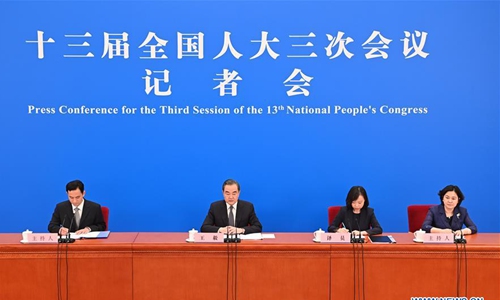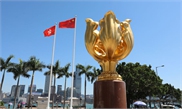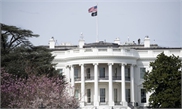Wang Yi: China seeks global peace, development, not hegemony
https://youtu.be/d_Lq9IQevac
https://youtu.be/652foE223co
https://youtu.be/ujAj1E9kzsA
br />
Has China implemented the "wolf warrior" diplomacy? When Chinese State Councilor and Foreign Minister Wang Yi responded to 23 questions during a press conference on Sunday, which of his answers confirmed the "wolf warrior" diplomacy? Did his answers interfere in any country's internal affairs? Did he threaten to sanction any country? Wang called the abuse of litigation against China over the COVID-19 outbreak "a product of three nos" - it has no ground, has no factual basis and has no international precedence. Attempts to blackmail China for the epidemic are daydreaming, Wang said. This might be the toughest answer he has ever given during the 100-minute press conference.Wolf Warriors 2: Hollywood-style hit, made in China
https://youtu.be/652foE223co
A Conversation With Wang Yi
https://youtu.be/ujAj1E9kzsA
In terms of "wolf warrior", the US has peaked in its diplomacy. Just look at how many countries are being sanctioned by the US, in how many places is the US stationing its troops and how many countries' internal affairs are being interfered with by the US?
China has always emphasized common interests and building a community with a shared future for mankind. We make only a reasonable but powerful counterattack when being attacked. There is a vivid metaphor that compares China to the Kung Fu Panda.
The negative trend in China-US relations has attracted global attention. Such a trend is a process of the two major powers' interactions. The two countries lack mutual trust and thus tensions escalate. Both countries say the other country is the reason for the worsening of their relations.
However, if we look at the China-US relations objectively, we can list the following basic facts.
First, China is a rising developing country. So far, it has not formed the strength to pose a substantial challenge to the US, nor does China have such a will.
Second, the US harbors strategic suspicions of China and China also has various expressions of its visions. But the core of China's foreign relations is development. Chinese actions that can be described as "overseas military expansion" are negligible. China has somewhat been active in areas in which it has territorial disputes with neighboring countries, but it has kept restraint in general. One proof is that China has not engaged in any military conflicts with its neighboring countries for over 30 years.
Third, China expands influence through its economic activities. This is a process whereby parties involved can mutually benefit and China does so under the US-led multilateral trading system. China hasn't forcibly changed trade rules but has accumulated a trade surplus under the current rules and with the hard work of its people.
Fourth, China has a different political system with the US and other Western countries, which has caused ideological disputes. But China is generally not a country that exports ideology. China's so-called overseas publicity aims only at increasing the external world's understanding and favor for China instead of subverting the Western system. The West is aggressive while China is defensive in their ideological disputes.
Fifth, the US elites always want to shape China. They are annoyed that China has firmly stayed on its own political path, and they worry that the successful Chinese path may affect Western society's confidence. But this is not China's fault since we have the right to walk on our own path without interfering in the development of any other countries.
Sixth, the Trump administration has launched the trade war against China, which is indeed bullying. The "America First" doctrine has caused widespread resentment worldwide and China is not the only victim. Since the COVID-19 outbreak, Washington has been passing the buck to Beijing. This is the odious move of the White House and the Republican Party for the sake of the 2020 election. This is typical international hooliganism.
Labeling Chinese diplomacy as "wolf warrior" reflects an extreme ideology. If Western public opinion uses the label to describe Chinese diplomacy, then it is vulgarizing its international political thinking and playing to the crowd.
Source link
RELATED ARTICLES:
- US should not underestimate Chinese people's determination for reunification: Wang Yi
- Foreign Minister Wang Yi meets the press on sidelines of the ongoing NPC session







No comments:
Post a Comment